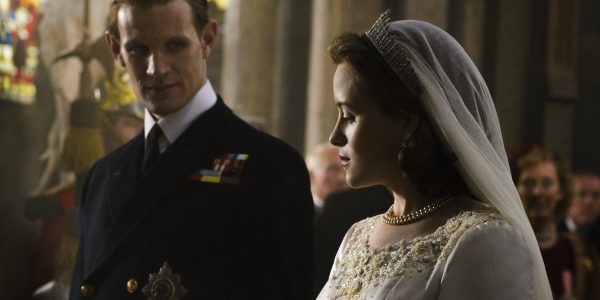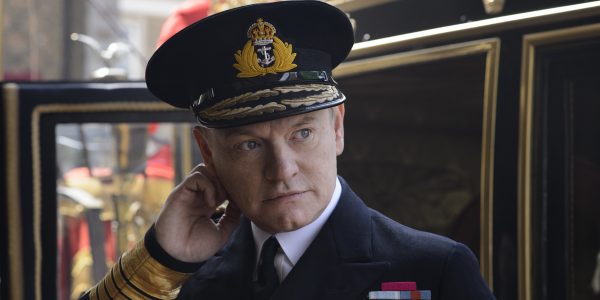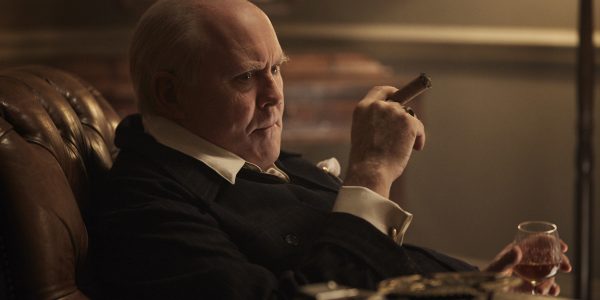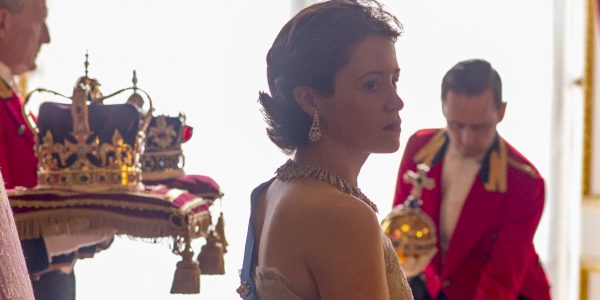The Crown Season One Review
"A beautiful and moving look at the people behind the crown"
I feel like I need to get this disclaimer out of the way before starting this review: I don't particularly care about the British royal family. Aside from studying the historical events that have impacted them over the past several centuries in school, I've never really given the royal family much thought. And I've certainly never taken the time to contemplate the mental and emotional drain the role of monarch takes on those who wear the crown. After all, in the modern British world, I've always simply assumed the title was more of a figurehead than anything truly worthy of sleepless nights and fear of the unknown. But watching the first season of Netflix's moving and smartly executed
The Crown gave me a completely different perspective on the early years of Elizabeth II's reign.
It's not easy to humanize people who have access to pretty much anything a person could want: money, prestige, fame, power. And coming at a show focused on royalty with the phrase "heavy is the head that wears the crown" as one of the central themes of the piece could easily backfire. After all, when you have everything you could possibly want and aren't happy, there's always a chance the audience will turn on the protagonists. But
The Crown manages to balance the heart and the mind of the piece: we, as an audience, can understand the mental and emotional toll the monarchy takes, not only on Elizabeth but on her entire family, while still investing in the triumphs and strength our protagonist has while in her official role as the British head of state.
Warning: The next section will contain spoilers for the first season of The Crown (and British history).

Claire Foy is very good at playing queens. After her superb outing as the fiery (and ultimately, tragic) Anne Boleyn in the spectacular miniseries
Wolf Hall (currently streaming on Amazon, I highly recommend it), Foy tackles the complex (and very different) role of Elizabeth with the same skill. Where Foy's Boleyn is a woman struggling to keep control of the small bit of power she has secured for herself in a time when women had little to no power at all, her Elizabeth is a woman who is lost in a role she never wanted.
Those familiar with the Windsor reign in England will already know the story (or, if you have watched the film
The King's Speech), but Elizabeth and her father, George VI (played by the absolutely wonderful Jared Harris of
Mad Men), never expected to ascend to the throne. George was the second son, and his brother Edward VIII was supposed to reign. Having the wounds of Edward's abdication reverberate throughout the season (and, one supposes, they will continue to fester in season two as well), lends a deep level of pain and distrust to the proceedings that is necessary to humanize the royals. With that as the groundwork for the rule of George, and later for Elizabeth, the series is clear to highlight that neither monarch wanted the throne. Neither was ready for the responsibility, and that created a feeling within each of being an imposter within the role.

It is rather difficult to put into words how wonderful both Foy and Harris are at expressing the dual nature of their characters- the steady royal presence when needed, but behind closed doors, the troubled and guilt-ridden individuals. Harris, in particular, does a brilliant job expressing, through physical actions and pained looks, how guilty George is that his eldest daughter will be burdened with the crown. Watching him work, you feel the weight the role has taken on George's own psyche (the spare, forced to take on responsibilities that he was never taught to endure), and how he fears those same responsibilities might bring down his precious daughter as well.
We know, from the vantage point of being 60 years down the line, that Elizabeth will, on the whole, survive and thrive as the Queen of England. But Foy captures the uncertainty of the young queen. The wife and mother who doesn't understand the political machinations that surround her role. Who isn't particularly fond of the press and can't command a crowd with the effortless charm her younger sister possesses. Yet, Foy makes clear that Elizabeth is smart. And savvy. She has the potential, even in the early years of her reign, to become a formidable monarch. Watching Foy build her performance as Elizabeth gains confidence and strength is riveting. And that Foy manages to do so without sacrificing the emotional elements of the character is particularly impressive.

The rest of the show's cast fares just as well, crafting complex and layered characters out of historical figures. John Lithgow brings a new take on Winston Churchill, removing the mystique and gravitas often found in the character and honing in on the elderly, fading statesman with a few final lessons to impart. But what works best throughout the ten-episode first season is the family dynamics between the various Windsors. It's rare to see the relationship between sisters handled with as much care and depth as the relationship between Elizabeth and Margaret. The generational gaps between the various generations, sharing the same space yet with different thoughts on the role of monarchy and the Cabinet in determining the lives of royals is of great interest to watch. And the pull between sacrificing the love of family for the necessity of duty is highlighted wonderfully throughout.

The series also looks amazing. The rumored $100 million price tag is seen in the opulent sets, the exotic locales, and the beautiful costumes. The writing is, as one expects when it comes from the mind of Peter Morgan (
The Queen,
Frost/Nixon), strong as well. Throughout the ten episodes, I only had once instance where I wasn't particularly swept up in the story and characters (that being in the fourth episode, where the use of Churchill's secretary as a means to get him to change his position on the smog was particularly manipulative and unbelievable).
The current cast (sans Lithgow) is expected to return for the second season of the series, set to begin filming early next year. Considering the major elements of British history still yet to come (the Suez Crisis is just around the corner at the end of the first season), I suspect the second season will be just as satisfying as the first. And, while Foy, Matt Smith, and the rest of the cast are not expected to remain with the series as their characters begin aging noticeably, I'm looking forward to seeing where this current talented group of actors take things over the next season- and who eventually takes over the characters down the line.
Pros
- Exceptional performances
- Gorgeous sets
- Strong writing
Cons
- One instance of overindulgence in the writing in episode four
 Claire Foy is very good at playing queens. After her superb outing as the fiery (and ultimately, tragic) Anne Boleyn in the spectacular miniseries Wolf Hall (currently streaming on Amazon, I highly recommend it), Foy tackles the complex (and very different) role of Elizabeth with the same skill. Where Foy's Boleyn is a woman struggling to keep control of the small bit of power she has secured for herself in a time when women had little to no power at all, her Elizabeth is a woman who is lost in a role she never wanted.
Those familiar with the Windsor reign in England will already know the story (or, if you have watched the film The King's Speech), but Elizabeth and her father, George VI (played by the absolutely wonderful Jared Harris of Mad Men), never expected to ascend to the throne. George was the second son, and his brother Edward VIII was supposed to reign. Having the wounds of Edward's abdication reverberate throughout the season (and, one supposes, they will continue to fester in season two as well), lends a deep level of pain and distrust to the proceedings that is necessary to humanize the royals. With that as the groundwork for the rule of George, and later for Elizabeth, the series is clear to highlight that neither monarch wanted the throne. Neither was ready for the responsibility, and that created a feeling within each of being an imposter within the role.
Claire Foy is very good at playing queens. After her superb outing as the fiery (and ultimately, tragic) Anne Boleyn in the spectacular miniseries Wolf Hall (currently streaming on Amazon, I highly recommend it), Foy tackles the complex (and very different) role of Elizabeth with the same skill. Where Foy's Boleyn is a woman struggling to keep control of the small bit of power she has secured for herself in a time when women had little to no power at all, her Elizabeth is a woman who is lost in a role she never wanted.
Those familiar with the Windsor reign in England will already know the story (or, if you have watched the film The King's Speech), but Elizabeth and her father, George VI (played by the absolutely wonderful Jared Harris of Mad Men), never expected to ascend to the throne. George was the second son, and his brother Edward VIII was supposed to reign. Having the wounds of Edward's abdication reverberate throughout the season (and, one supposes, they will continue to fester in season two as well), lends a deep level of pain and distrust to the proceedings that is necessary to humanize the royals. With that as the groundwork for the rule of George, and later for Elizabeth, the series is clear to highlight that neither monarch wanted the throne. Neither was ready for the responsibility, and that created a feeling within each of being an imposter within the role.
 It is rather difficult to put into words how wonderful both Foy and Harris are at expressing the dual nature of their characters- the steady royal presence when needed, but behind closed doors, the troubled and guilt-ridden individuals. Harris, in particular, does a brilliant job expressing, through physical actions and pained looks, how guilty George is that his eldest daughter will be burdened with the crown. Watching him work, you feel the weight the role has taken on George's own psyche (the spare, forced to take on responsibilities that he was never taught to endure), and how he fears those same responsibilities might bring down his precious daughter as well.
We know, from the vantage point of being 60 years down the line, that Elizabeth will, on the whole, survive and thrive as the Queen of England. But Foy captures the uncertainty of the young queen. The wife and mother who doesn't understand the political machinations that surround her role. Who isn't particularly fond of the press and can't command a crowd with the effortless charm her younger sister possesses. Yet, Foy makes clear that Elizabeth is smart. And savvy. She has the potential, even in the early years of her reign, to become a formidable monarch. Watching Foy build her performance as Elizabeth gains confidence and strength is riveting. And that Foy manages to do so without sacrificing the emotional elements of the character is particularly impressive.
It is rather difficult to put into words how wonderful both Foy and Harris are at expressing the dual nature of their characters- the steady royal presence when needed, but behind closed doors, the troubled and guilt-ridden individuals. Harris, in particular, does a brilliant job expressing, through physical actions and pained looks, how guilty George is that his eldest daughter will be burdened with the crown. Watching him work, you feel the weight the role has taken on George's own psyche (the spare, forced to take on responsibilities that he was never taught to endure), and how he fears those same responsibilities might bring down his precious daughter as well.
We know, from the vantage point of being 60 years down the line, that Elizabeth will, on the whole, survive and thrive as the Queen of England. But Foy captures the uncertainty of the young queen. The wife and mother who doesn't understand the political machinations that surround her role. Who isn't particularly fond of the press and can't command a crowd with the effortless charm her younger sister possesses. Yet, Foy makes clear that Elizabeth is smart. And savvy. She has the potential, even in the early years of her reign, to become a formidable monarch. Watching Foy build her performance as Elizabeth gains confidence and strength is riveting. And that Foy manages to do so without sacrificing the emotional elements of the character is particularly impressive.
 The rest of the show's cast fares just as well, crafting complex and layered characters out of historical figures. John Lithgow brings a new take on Winston Churchill, removing the mystique and gravitas often found in the character and honing in on the elderly, fading statesman with a few final lessons to impart. But what works best throughout the ten-episode first season is the family dynamics between the various Windsors. It's rare to see the relationship between sisters handled with as much care and depth as the relationship between Elizabeth and Margaret. The generational gaps between the various generations, sharing the same space yet with different thoughts on the role of monarchy and the Cabinet in determining the lives of royals is of great interest to watch. And the pull between sacrificing the love of family for the necessity of duty is highlighted wonderfully throughout.
The rest of the show's cast fares just as well, crafting complex and layered characters out of historical figures. John Lithgow brings a new take on Winston Churchill, removing the mystique and gravitas often found in the character and honing in on the elderly, fading statesman with a few final lessons to impart. But what works best throughout the ten-episode first season is the family dynamics between the various Windsors. It's rare to see the relationship between sisters handled with as much care and depth as the relationship between Elizabeth and Margaret. The generational gaps between the various generations, sharing the same space yet with different thoughts on the role of monarchy and the Cabinet in determining the lives of royals is of great interest to watch. And the pull between sacrificing the love of family for the necessity of duty is highlighted wonderfully throughout.
 The series also looks amazing. The rumored $100 million price tag is seen in the opulent sets, the exotic locales, and the beautiful costumes. The writing is, as one expects when it comes from the mind of Peter Morgan (The Queen, Frost/Nixon), strong as well. Throughout the ten episodes, I only had once instance where I wasn't particularly swept up in the story and characters (that being in the fourth episode, where the use of Churchill's secretary as a means to get him to change his position on the smog was particularly manipulative and unbelievable).
The current cast (sans Lithgow) is expected to return for the second season of the series, set to begin filming early next year. Considering the major elements of British history still yet to come (the Suez Crisis is just around the corner at the end of the first season), I suspect the second season will be just as satisfying as the first. And, while Foy, Matt Smith, and the rest of the cast are not expected to remain with the series as their characters begin aging noticeably, I'm looking forward to seeing where this current talented group of actors take things over the next season- and who eventually takes over the characters down the line.
The series also looks amazing. The rumored $100 million price tag is seen in the opulent sets, the exotic locales, and the beautiful costumes. The writing is, as one expects when it comes from the mind of Peter Morgan (The Queen, Frost/Nixon), strong as well. Throughout the ten episodes, I only had once instance where I wasn't particularly swept up in the story and characters (that being in the fourth episode, where the use of Churchill's secretary as a means to get him to change his position on the smog was particularly manipulative and unbelievable).
The current cast (sans Lithgow) is expected to return for the second season of the series, set to begin filming early next year. Considering the major elements of British history still yet to come (the Suez Crisis is just around the corner at the end of the first season), I suspect the second season will be just as satisfying as the first. And, while Foy, Matt Smith, and the rest of the cast are not expected to remain with the series as their characters begin aging noticeably, I'm looking forward to seeing where this current talented group of actors take things over the next season- and who eventually takes over the characters down the line.